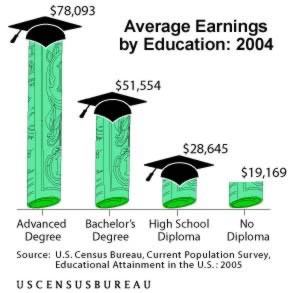College Savings: The Basics of Saving for College
Got kids? If so, you're probably hoping to send them to college. And you know it won't be cheap. College costs are rising faster than inflation, and have been for decades.
But that doesn't mean you can't afford a good education for your kids, even if you have a modest salary or other substantial expenses. I'm not going to pretend college isn't expensive: Full scholarships are less common in real life than they are in the movies. You'll probably have to spend a pretty penny for the privilege of attending your son or daughter's college graduation.
The value of a college education
Even with the skyrocketing costs, a college education is still a good deal. Post-college educations tend to garner graduates salaries that are 60 percent higher than those of high school graduates. Over a lifetime, college graduates typically earn $1 million more than those without college educations.
Life after school: Advice for new graduates
On Tuesday evening I gave my first-ever presentation about personal finance. I spoke to a group of about 70 graduating seniors from Western Oregon University. My talk went okay. It wasn't terrible, but it certainly wasn't good. It's a start. I learned a lot, and I'll do better next time.
I was the fourth and final speaker of the evening, though. Before I talked about personal finance, three WOU alums spoke about life after college. While my talk might have been mediocre, theirs were outstanding.
Brian Reick
The first speaker was Brian Reick, who described his experience moving from job-to-job. He began knocking on doors right out of school and eventually found work. But the job wasn't perfect, and neither was he. He was fired after only two years. This experience taught him a couple things:
Some Thoughts on Goals and Adult Education
Last night, Kris and I had dinner with Craig and Lisa. Craig is an architect. Lisa is a technical writer who has spent the past few years as a stay-at-home mother. (Lisa contributed two articles to GRS last year: How to find great deals on eBay and Career advice for the college graduate.)
Now that their children are a little older, Lisa has the itch to return to the workplace, to find some non-motherly pursuit to fulfill her. (She's a great mom, by the way, but she does have other aspirations.) She's now in her second term at a local university, studying to obtain a degree in graphic arts. She's taking just one evening class per term, but she loves it. This is something she's wanted to do for a long time, and she's juggled her life to make it happen.
After Lisa finished telling us about her classes — art history and Photoshop — I mentioned that I'd been thinking about going back to school, too. "One thing about making my living as a writer," I said, "is that it allows me freedom of hours. I can work when I want. I'm not sure I'm ready to take on another responsibility, but if I wanted to, I feel like I could pursue any degree I wanted: finance, computers, history."
The value of a college education
 I've been thinking lately about the value of a college education. I earned a B.A. in Psychology from Willamette University in 1991 (with a minor in English Lit, and almost another minor in Speech Com). What have I done with this degree? Almost nothing. Yet I do not regret the money and years I spent working to earn it.
I've been thinking lately about the value of a college education. I earned a B.A. in Psychology from Willamette University in 1991 (with a minor in English Lit, and almost another minor in Speech Com). What have I done with this degree? Almost nothing. Yet I do not regret the money and years I spent working to earn it.
The Financial Value of a College Degree
Does earning a college degree make a difference to your future? Absolutely. The facts are striking. On average, those who have a college degree earn almost twice as much as those who do not. According to the U.S. Census Bureau:
Adults with advanced degrees earn four times more than those with less than a high school diploma. Workers 18 and older with a master's, professional or doctoral degree earned an average of $82,320 in 2006, while those with less than a high school diploma earned $20,873.
Career advice for the college graduate
This article was written by Lisa Lessley Briscoe.
My friend (and fellow Bearcat) Lisa writes: "I was just poking around on GRS (I don't usually read) and noticed that you'd posted an entry for college graduates recently. Funny how summer rolls around and you start thinking about stuff." She's passed along some additional advice for those just entering the workplace.

Congratulations, you just graduated from an excellent liberal arts college!
27 money tips for college students
School's back in session, and with it come life-lessons in money management for students. But personal finance can be easy, even if you're just starting out. You just have to know how it works. All of the following are concepts I wish I had known before heading to college.

Money Management
Now that you're on your own, you might be tempted to spend money on all the things your parents wouldn't let you have before. Go slow. If you play it smart, you can avoid the sort of money troubles that plague many young adults.
- Join a credit union. Don't just sign up for a random bank giving away t-shirts or frisbees at registration. Track down a credit union in town, or do some research into online banks.
- Don't get a credit card unless you absolutely need one. Don't be a sucker. Those guys sitting behind the sign-up table are not there to help you. They're there to make money.
- Avoid non-academic debt. It might seem like a good idea to put that Xbox on a credit card, but it's not. Focus on developing good money skills with cash. Worry about credit later.
- Save and then splurge. If you decide you must have that Xbox, then save for it. Wait until you can pay cash.
- Pay your bills on time. Basic advice, but it's surprising how many people lose track of things. If you pay your bills as they arrive, you won't have to worry about forgetting them.
Organization and Planning
Some minimal organization will keep your finances in order. Each of these is an important adult financial skill.
Why I love community college
Community colleges are an oft-overlooked resource for cheap education. They offer classes from trained professionals and provide access to expensive equipment that you otherwise would never be able to use. I love community college for several of reasons:
- Affordability — Community college classes are affordable. Despite recent tuition increases, a class at Portland Community College costs about $200. Community education courses (non-credit classes) cost even less. Some employers will pay for classes; my business will pay for one class per employee per term. If your employer doesn't have a similar policy, ask!
- Facilities — Community colleges have facilities and practical training unavailable at most universities. My local community college has a wood shop, an automotive shop, and quality darkrooms. Many students take classes simply for access to the facilities. A typical woodworking class is self-directed — you decide what your project is, and then have open access to expensive equipment and an instructor willing to help you use it.
- Instructors — Community college classes are generally taught by real professionals from the field. When I learned computer programming, my classes were taught by instructors who wrote code every day for actual employers. (One of my instructors also taught at Portland State University — she taught the exact same courses at Portland Community College for a quarter the cost.) When I take photography classes, I'm being taught by active professional photographers. One of my writing instructors was Craig Lesley, a prominent Northwest author.
- Networking — Community college classes allow you to network with instructors and students, making valuable contacts in your hobby or profession. I took photography classes at the community college for a couple of years, and the contacts I made in these classes continue to benefit me: I can e-mail my former instructors with questions and ideas; I trade photography equipment with other students; I get to watch as certain students make the leap from amateur to professional. I'm currently in a writers group with a former instructor. Some students land jobs through the contacts they make in class.
- Convenience — Community colleges are aware that they serve a large population of students seeking continuing education. They try to make their classes as convenient as possible. I've taken night classes in computer science, writing, photography, algebra, Spanish, and business management. I've taken weekend classes in application design. I've taken late-afternoon classes in assembly language programming. Community colleges make it easy to get additional education.
- Education — Most importantly, community colleges act as a safety net for those who need an education. Some kids aren't ready for high school. Others aren't ready for college. Community colleges are there to help those who have realized the value of an education and are looking to correct mistakes they've made in the past. Even adults in mid-career can use community college courses to change their focus. After eighteen months of community college computer programming courses, I landed a job hacking C++ for an environmental engineer.
When I was in high school, I made fun of the local community college. You'd never catch me going to such a place. No, instead I went to a fancy private institution where yearly tuition cost as much as a nice car. And while I was earning my degree from this fancy private institution (which I love, by the way — don't get me wrong), I made fun of the local community college. That was a place for losers. I'm older now, and wiser.
Over the past fifteen years I've attended a score of community college courses. Only one (small business management) has been a dud. Oftentimes on AskMetafilter, a user will post a question like "How can I improve my photography skills?" or "I want to get better at programming for cheap" or "What's a good way to learn woodworking?" My answer is always: sign up for a class at the community college.